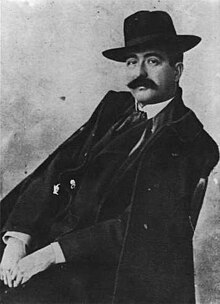Pietro Gori
| Pietro Gori | |
|---|---|
 |
|
| Born |
August 1, 1865 Messina, Italy |
| Died | January 8, 1911 (aged 45) Portoferraio, Italy |
| Organization | Federación Obrera Regional Argentina |
| Movement | Anarchist Movement |
Pietro Gori (14 August 1865 – 8 January 1911) was an Italian lawyer, journalist, intellectual and anarchist poet. He is known for his political activities, and as author of some of the most famous anarchist songs of the late 19th century, including Addio a Lugano ("Farewell to Lugano"), Stornelli d'esilio ("Exile Songs"), Ballata per Sante Caserio ("Ballad for Sante Geronimo Caserio"), Inno del Primo Maggio ("May, 1 Anthem").
Born in Messina of Tuscan parents in 1865, he moved with his family to Livorno. At a young age he joined a Monarchist Association but was expelled for dishonourable conduct. Gori then began writing for a moderate journal La Riforma. In 1886, he enrolled in the University of Pisa. He soon joined the Anarchist movement there and quickly becoming one of its most influential figures. In 1887, Gori was arrested for having written about the Chicago protesters killed in the Haymarket Square Riot, and having protested the presence of United States ships in the port of Livorno.
The next year, as secretary of the students' union, he organized a memorial for philosopher Giordano Bruno. Gori received a law degree in 1889 with a thesis called La miseria e il delitto ("Poverty and Crime"). In November, under the pseudonym Rigo (an anagram of his last name), he published the texts of his first conferences in a booklet called Pensieri ribelli ("Rebel Thoughts"), resulting in his arrest for "inciting class hatred". A legal team composed of his professors and fellow students defended him; he was cleared of the charges and released.
...
Wikipedia
